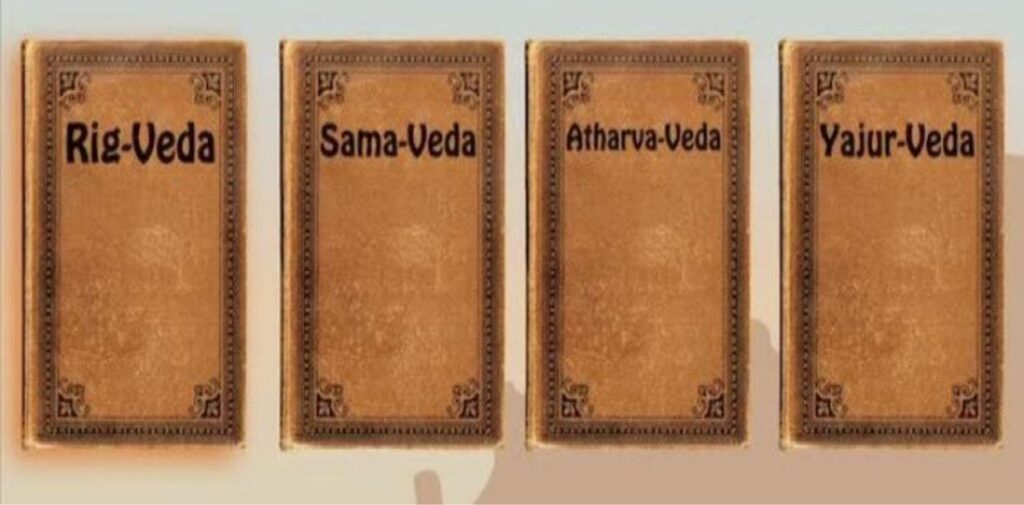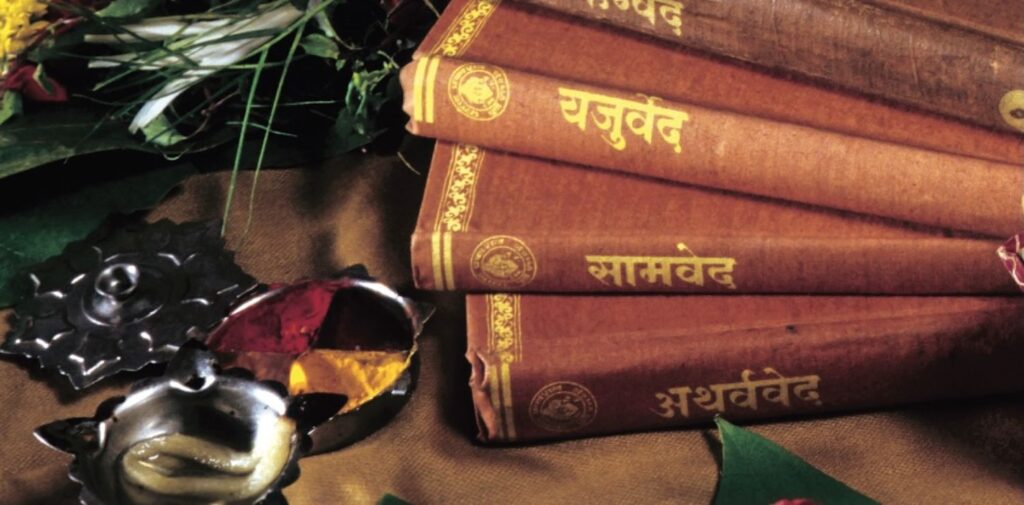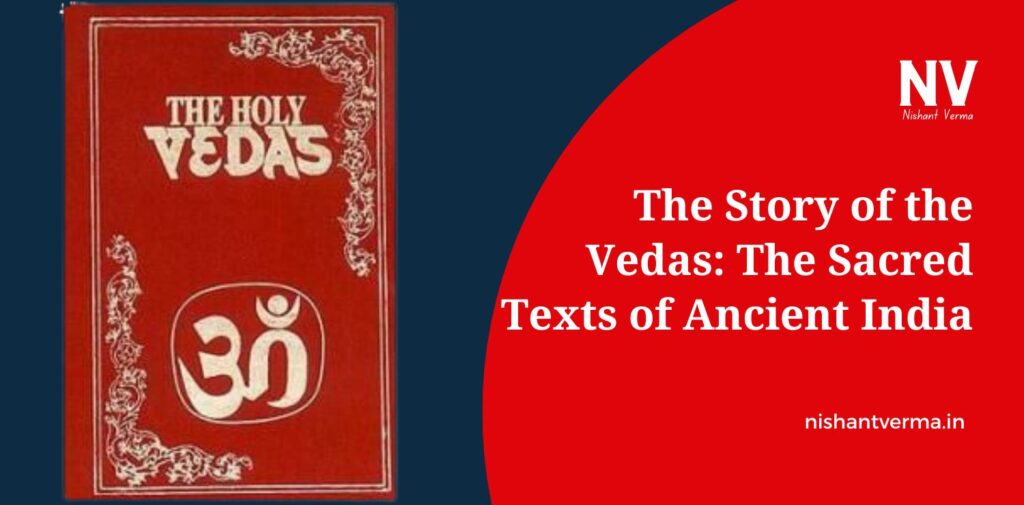India is a land full of ancient stories, wisdom, and traditions that have shaped the culture and history of the country. One of the most important parts of India’s spiritual and philosophical history are the Vedas, the sacred texts that form the foundation of Hinduism. The Vedas are some of the oldest books in the world, and they contain knowledge about life, nature, the universe, and how humans should live. In this article, we will take a simple and easy journey through the story of the Vedas, explaining what they are, where they come from, and why they are so important.
What Are the Vedas?
The word “Veda” comes from an ancient Sanskrit word meaning “knowledge” or “wisdom.” The Vedas are a collection of sacred texts that contain prayers, hymns, mantras, rituals, and teachings. These texts are considered to be divinely revealed, meaning that they are believed to have been given to ancient sages or rishis by the gods themselves.
The Vedas are the oldest scriptures of Hinduism and form the basis for many of its teachings. They help us understand the beliefs, values, and practices of the people who lived in ancient India.

The Four Vedas
There are four main Vedas, and each one is divided into different parts. Each Veda has a specific focus and purpose. Here are the four Vedas:
- Rigveda
- Samaveda
- Yajurveda
- Atharvaveda
Let’s look at each Veda in a bit more detail:
Rigveda
The Rigveda is the oldest and most important of all the Vedas. It is made up of over a thousand hymns (called “suktas”) that are dedicated to various gods and natural forces. These hymns are filled with praises, prayers, and invocations to the gods. The Rigveda teaches about the creation of the world, the nature of the gods, and the importance of rituals and sacrifices in maintaining harmony between humans and the divine.
Samaveda
The Samaveda is a collection of melodies and chants used during rituals and sacrifices. It is closely linked to the Rigveda and contains many verses from the Rigveda that are meant to be sung in a special way. The Samaveda is considered the “Veda of Song,” as it focuses on the musical aspects of the sacred rituals. The chants in the Samaveda were meant to create a connection between the people and the gods, making them feel closer to the divine.
Yajurveda
The Yajurveda is the Veda of rituals and sacrifices. It contains instructions on how to perform rituals, ceremonies, and sacrifices to honor the gods. These rituals were an important part of life in ancient India, as they were believed to bring prosperity, peace, and blessings. The Yajurveda contains both mantras (sacred chants) and prose that explain the details of various rituals.
Atharvaveda
The Atharvaveda is different from the other three Vedas because it contains a mixture of hymns, prayers, and magical spells. It deals with everyday life, including health, prosperity, and protection from evil. The Atharvaveda also includes hymns to various gods, as well as verses to help with healing, finding success, and solving problems. Some parts of the Atharvaveda are also concerned with the removal of obstacles in life.

The Importance of the Vedas
The Vedas are not just ancient books; they are deeply important to the spiritual and cultural life of Hindus. Here’s why:
- Spiritual Wisdom The Vedas are considered the ultimate source of knowledge in Hinduism. They provide guidance on how to live a life that is in harmony with the universe and the divine. The teachings of the Vedas help people understand their purpose in life, the nature of the universe, and the path to spiritual growth.
- Connection with the Gods The Vedas teach that humans should live in harmony with the gods and the forces of nature. Through the rituals and prayers found in the Vedas, people could connect with the gods and ask for their blessings. This connection with the divine was believed to bring peace, happiness, and prosperity.
- Rituals and Sacrifices The Vedas emphasize the importance of performing rituals and sacrifices to honor the gods. These rituals were considered essential to maintaining balance in the world and ensuring the well-being of the people. Even today, many Hindu rituals and festivals have their roots in the teachings of the Vedas.
- Philosophical Teachings The Vedas contain deep philosophical ideas about the nature of life, the soul, and the universe. They ask important questions about existence, the meaning of life, and how people should live. These philosophical ideas form the foundation of many Hindu beliefs, such as karma (the law of cause and effect) and moksha (liberation from the cycle of birth and rebirth).
The Creation of the Vedas
The Vedas were not written down like books today. They were passed down orally from generation to generation. In ancient times, people did not have paper or pens, so the Vedas were memorized and recited by priests, sages, and students. It is believed that the Vedas were composed over thousands of years, starting around 1500 BCE and continuing into the early centuries of the Common Era.
The Vedas were first composed in the ancient language of Sanskrit, which was spoken by the people of India at that time. The language of the Vedas is beautiful and poetic, and it was carefully preserved over the centuries to maintain its purity and meaning.
The Role of the Rishis
The sages or rishis who created the Vedas were highly respected and revered. They were believed to have received their knowledge through divine inspiration. According to Hindu tradition, the rishis were able to “hear” the words of the gods, which they then passed on to others. This is why the Vedas are considered to be “revealed” texts.
The rishis spent many years meditating, praying, and reflecting on the nature of life, the universe, and the gods. Through their deep wisdom, they were able to understand the mysteries of existence and express them in the form of hymns and prayers.

Vedas and Hinduism Today
Even though the Vedas were written thousands of years ago, their teachings are still very much alive in India today. Many Hindu prayers, rituals, and festivals are based on the hymns and mantras from the Vedas. The Vedas are still studied by scholars, priests, and spiritual seekers, and they continue to inspire people to live lives of truth, wisdom, and kindness.
In Hindu temples, you can often hear priests chanting verses from the Vedas, and many of the hymns are still sung in a special way to connect with the divine. The Vedic teachings about karma, dharma (duty), and moksha continue to guide Hindus in their everyday lives.
Conclusion: The Story of the Vedas
The Vedas are much more than just ancient books—they are the very foundation of Hinduism and the spiritual and philosophical traditions of India. These sacred texts teach us about the gods, the universe, and how we should live our lives. The wisdom of the Vedas has been passed down through generations and continues to inspire millions of people today. By studying the Vedas, we can learn valuable lessons about truth, peace, and the importance of living in harmony with the world around us. The story of the Vedas is the story of India’s rich spiritual heritage, and it remains one of the most important legacies in the world.




